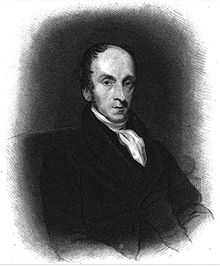
Richard Watson
Richard Watson (1781–1833) was a British Methodist theologian who was one of the most important figures in 19th century Methodism.
Watson was born in Lincolnshire and entered the Methodist itinerancy in 1796, serving as President of Conference in Britain in 1826 and as secretary to the Wesleyan Missionary Society from 1821 to 1825. In Britain, he was a leading opponent of slavery.
Watson was a gifted writer and theologian. In 1818 he wrote a reply to Adam Clarke's doctrine of the eternal Sonship of Christ; Watson believed that Clarke's views were unorthodox and, therefore, not faithfully Wesleyan. In 1823 he began to publish his Theological Institutes, which remained a standard for many years. It was the first attempt to systematize John Wesley's theology and, by extension, Methodist doctrine. In 1831, he wrote a well-regarded life of John Wesley.
References
Further reading
External links
|
|---|
| | Background | | |
|---|
| | Distinctive doctrines | |
|---|
| | People | |
|---|
| | Largest groups | |
|---|
| Related and
uniting movements | |
|---|
|
 Methodism portal Methodism portal |
|
| Persondata |
|---|
| Name |
Watson, Richard |
| Alternative names |
|
| Short description |
British methodist theologian |
| Date of birth |
1781 |
| Place of birth |
|
| Date of death |
1833 |
| Place of death |
|

 This article incorporates text from a publication now in the public domain: "Watson, Richard (1781-1833)". Dictionary of National Biography. London: Smith, Elder & Co. 1885–1900.
This article incorporates text from a publication now in the public domain: "Watson, Richard (1781-1833)". Dictionary of National Biography. London: Smith, Elder & Co. 1885–1900. 